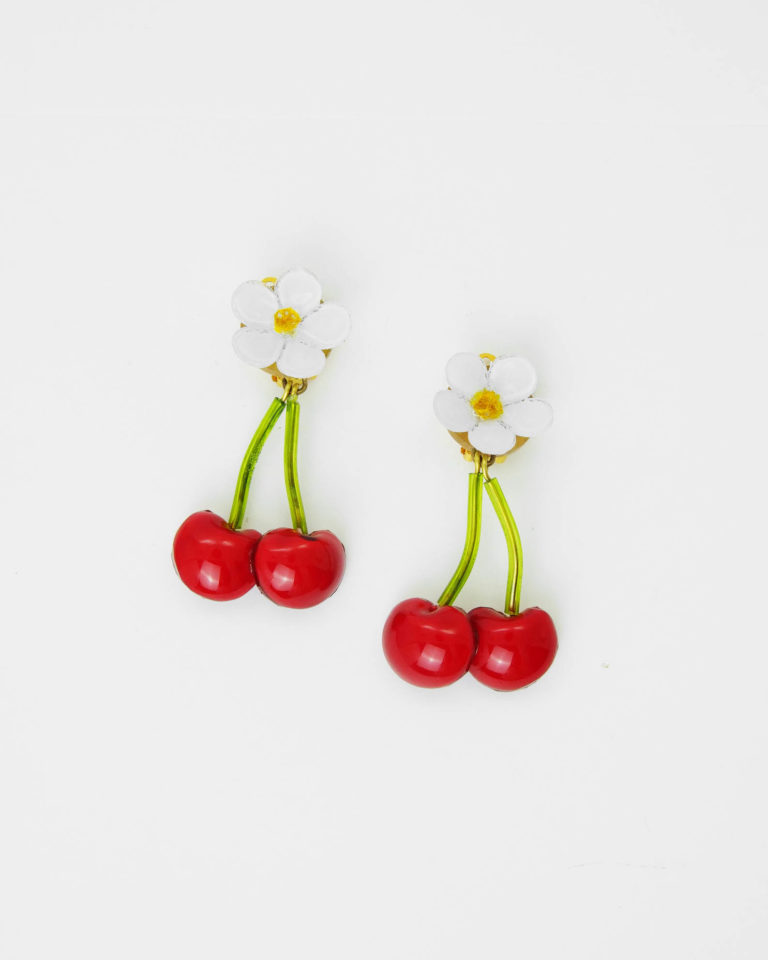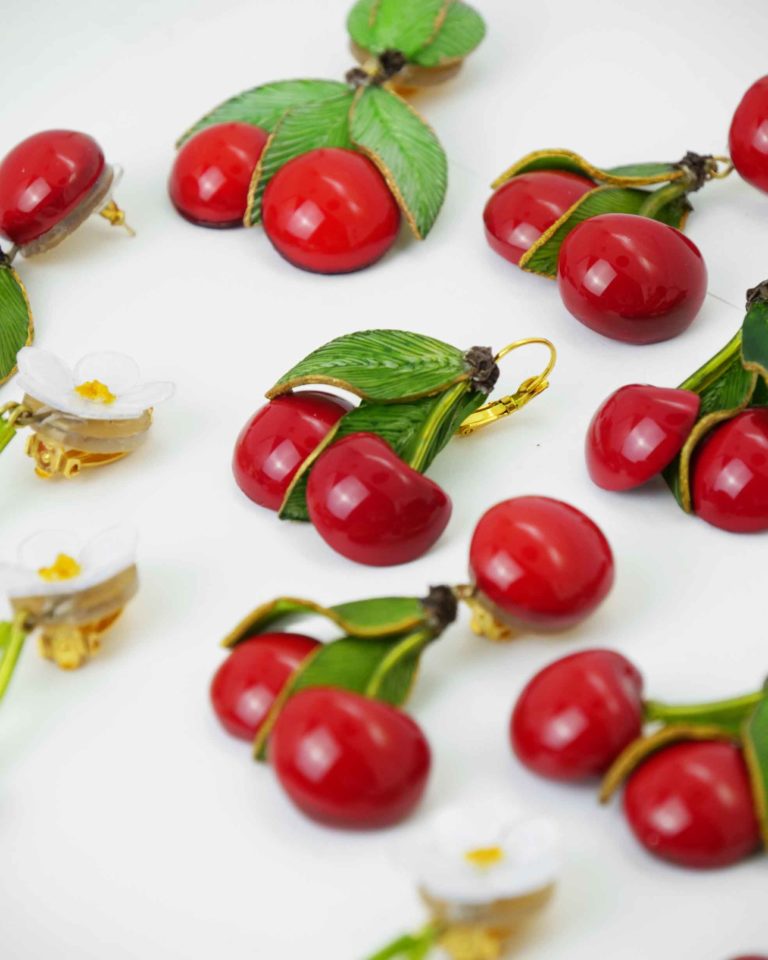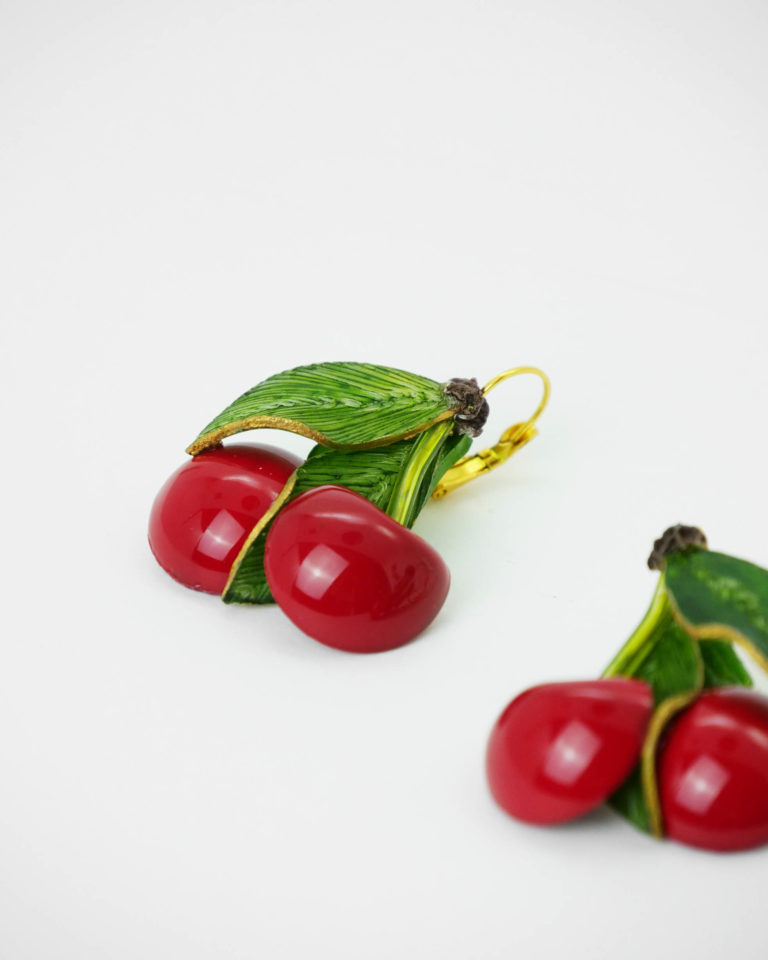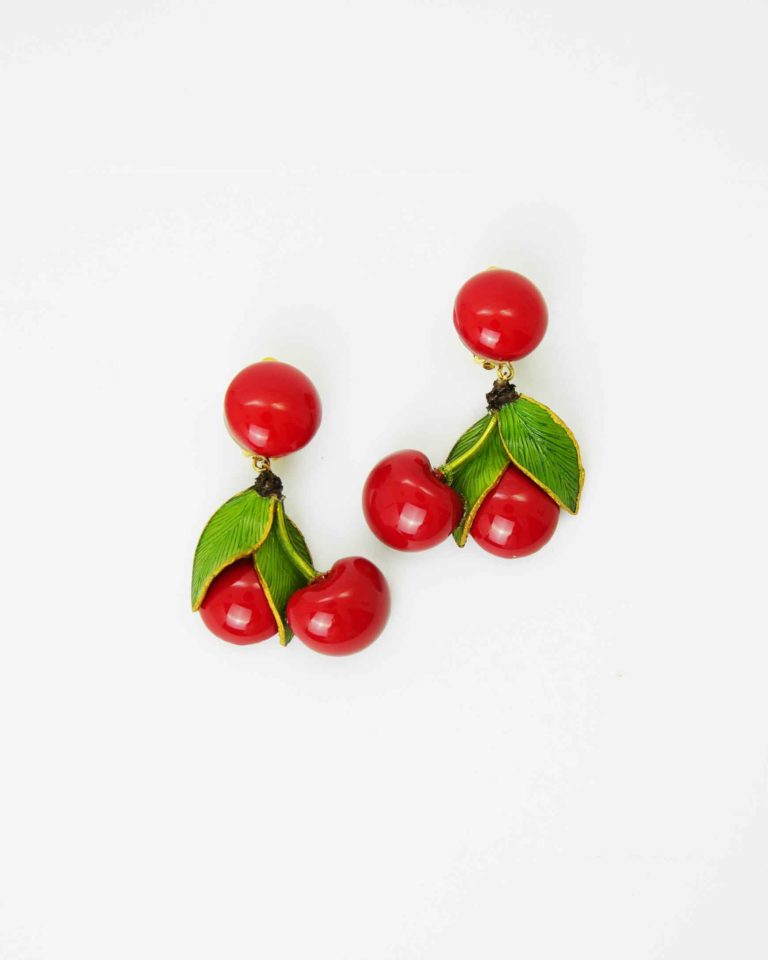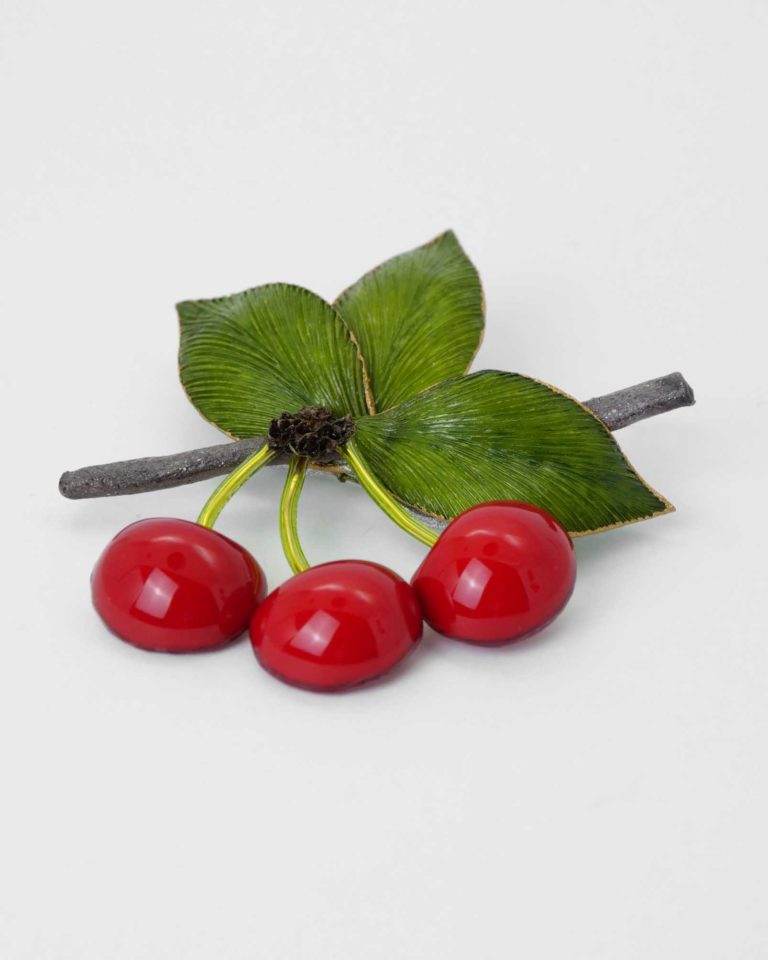To celebrate the arrival of Spring, we have prepared a new colorful and gourmet collection!
Like all our jewellery, each piece is hand-made in France in our artisanal workshop.
But do you know where the name of the collection comes from? We’ll tell you all about it!

This collection is inspired by a French song that our grandparents used to sing to us as children, called “Le temps des cerises” (“Cherry Season”). You may know this song:
![]()
Quand nous chanterons le temps des cerises,
Et gai rossignol, et merle moqueur
Seront tous en fête !
Les belles auront la folie en tête
Et les amoureux du soleil au cœur !
Quand nous chanterons le temps des cerises
Sifflera bien mieux le merle moqueur !
Mais il est bien court, le temps des cerises
Où l’on s’en va deux cueillir en rêvant
Des pendants d’oreilles…
Cerises d’amour aux robes pareilles,
Tombant sous la feuille en gouttes de sang…
Mais il est bien court, le temps des cerises,
Pendants de corail qu’on cueille en rêvant !
Jean-Baptiste Clément (1866)
English translation:
When we sing the time of cherries,
And cheerful nightingale, and mockingbird
Will all be celebrating!
The beautiful ones will have madness in mind
And sun lovers at heart!
When we sing the time of cherries
The mockingbird will whistle much better!
But it is very short, the time of cherries
Where we go two picking while dreaming
Ear pendants…
Love cherries with dresses like this,
Falling under the leaf in drops of blood .
But the cherry time is very short,
Coral pendants that you pick in your dreams!


A BIT OF HISTORY?
Do you know the origin of this popular romantic song?
It was in 1866 that the songwriter and revolutionary Jean-Baptiste Clément wrote the lyrics of the future romance Le Temps des Cerises.
Born on 31 May 1837 in Boulogne-sur-Seine, in the Paris region, this son of a rich miller had broken with his family and earned his living at the age of 14 as a bronze worker. He then went on to work in various trades (wine merchant, earthmover, journalist) and settled at Butte Montmartre in Paris. A militant for the republic, he very early came to know the imperial prisons under Napoleon III.
An exalted doctrinaire, a glimpse of his ideas can be read in a sheet he founded, and which will moreover earn him a few condemnations because of his numerous attacks against the power in place: “Down with the exploiters! Down with despots! Down with borders! Down with conquerors! Down with war! And long live social equality. “An orator who listened to the crowds, a convinced supporter of the revolution of 4 September, a very active militant during the Parisian uprising of 18 March 1871 (delegate to the Paris Commune, he had succeeded Clemenceau in May 1871 as mayor of Montmartre), Jean-Baptiste Clément had to go into exile in London for 8 years: sentenced to death in absentia in 1874, amnestied in 1879, he returned to Paris the following year. Delegate for propaganda by the Federation of Socialist Workers, he travelled throughout the province and founded the Socialist Federation of the Ardennes. Worn out by so many struggles and political battles, he died on 23 June 1903 in Paris, at the age of 66…
 The songs of Jean-Baptiste Clément that he wrote from the age of 20, the most famous of which are : Eighty-nine, L’Eau va toujours à la rivière, Fournaise, Ah! le joli temps…had a certain popular success, partly thanks to the interpretive talent of Joseph Darcier, the future interpreter of Gustave Nadaud’s songs.He was performing at L’Eldorado at the time. He is also the author of several collections of songs: “Les traîne-misère”, “Les gueux”,” Le Bonhomme Misère”, “Connais-tu l’Amour” ?, and among all his production, one of his tunes is particularly well known to young children who still hum it today. It is moreover far from the revolutionary ideas of its author, since it is the round “Dansons la Capucine” !
The songs of Jean-Baptiste Clément that he wrote from the age of 20, the most famous of which are : Eighty-nine, L’Eau va toujours à la rivière, Fournaise, Ah! le joli temps…had a certain popular success, partly thanks to the interpretive talent of Joseph Darcier, the future interpreter of Gustave Nadaud’s songs.He was performing at L’Eldorado at the time. He is also the author of several collections of songs: “Les traîne-misère”, “Les gueux”,” Le Bonhomme Misère”, “Connais-tu l’Amour” ?, and among all his production, one of his tunes is particularly well known to young children who still hum it today. It is moreover far from the revolutionary ideas of its author, since it is the round “Dansons la Capucine” !
One fine evening in 1867, Jean-Baptiste Clément went to find Antoine Renard (1825-1872). Originally from Lille, this former tenor of the Opera had converted to music hall and performed at the café-concert of L’Eldorado. Opened in 1858 and located at 4 boulevard de Strasbourg, in the 10th arrondissement of Paris, this establishment, which was both a café and a concert hall, was home to the operetta composer Hervé, who conducted the orchestra there.He asked him to set to music his poem Le Temps des Cerises, which he did some time later. This song then became the hymn of all the communards and workers. It was only after his return from exile that Jean-Baptiste Clément added the dedication in 1882: “To the valiant citizen Louise, the ambulance driver of the rue Fontaine-au-Roi, on Sunday 28th May 1871”. That day, with Eugène Varlin and Charles Ferré, both later condemned to death and shot, Clément was on the last of the barricades; Louise Michel, the “Red Virgin of the Commune”, was there.
Author of romances and other songs : “Le Chasse neige”, “Le Bonheur des Champs”,” Le Couteau de Jeannette”, “Fille des champs”, “Le Barde Gaulois”…, Antoine Renard had his Temps des Cerises published, at least at the beginning, by J. Kybourtz, 40 Passage du Havre à Paris (now published by Salabert).He dedicated his score ” To my friend Anatole Lionnet “. The latter, a friend of Gounod who made him dedicate in 1855 his melody “Mon habit” (Heugel), composed himself arias and romances, like this “Hymne d’amour” or “Le petit pioupiou”, sung and recorded at the beginning of the century by the baritone of the Opera Jean Noté and André Marchal.
If Le Temps des Cerises was initially a revolutionary song, today it is nothing more than a beautiful love song whose success has never been denied. Since the beginning of the century, many artists have interpreted it, some of them with great talent : André Dassary, Suzy Delair, Tino Rossi, Charles Trenet, Yves Montand, Mouloudji, Nana Mouskouri, Michel Fugain, Colette Renard… and more recently Juliette Gréco (1994), Demis Roussos (1996), Florian Lambert (1998) and Marie-Denise Pelletier (2000)…
Denis Havard de la Montagne
THE COLLECTION
Source: http://www.musimem.com/temps_des_cerises.htm



